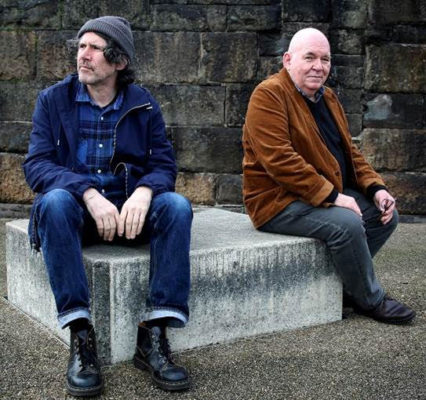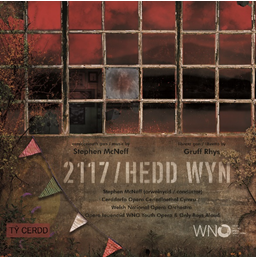Emma Schofield went along to the Wales Millennium Centre’s Glanfa Stage for the launch of 2117 Hedd Wyn, a new Welsh language opera, set against a post-apocalyptic background and drawing its inspiration from well-known events of the past.
I can’t recall being invited to the launch of anything quite like 2117 Hedd Wyn before. With lyrics written by Gruff Rhys (best known as part of the Super Furry Animals) and an orchestral score composed by Stephen McNeff this new Welsh language opera has a dystopian angle; set almost 100 years in the future, the opera charts the life and career of the famous war poet Hedd Wyn, a plotline played out against the backdrop of a North Wales landscape left barren in the wake of a nuclear disaster. Lines between past and future become blurred as events move towards tragedy. As the story unfolds it becomes apparent that a radiation leak has led to communities being displaced and has somehow enabled characters and events from the past to seep into this futuristic landscape.
Much of the history which informs the narrative for the opera will be familiar to audiences. Hedd Wyn, the bardic name of Welsh poet and soldier Ellis Humphrey Evans, was tragically killed in the trenches of World War I, aged just thirty. He was posthumously awarded the Chair at the 1917 National Eisteddfod for his work, which often had a religious focus, and which centred on war poetry following the start of the First World War. Perhaps not the obvious subject of a futuristic opera and yet, somehow, it seems to work. The intricate dance between past, present and future in the opera is a poignant reminder that the consequences of the past are hard to escape. As a poet Hedd Wyn became symbolic of a whole generation which was lost during World War I, in 2117 Hedd Wyn his story is intertwined with that of another generation, one hundred years in our future and also at risk of being lost due to nuclear disaster at a plant in Trawsfynydd. Two hundred years apart, but both stories of avoidable human loss.
The discussion at the launch was punctuated with three songs from the opera, performed by LLio Evans
and Dafydd Allen, and accompanied by Rhiannon Pritchard. It was fascinating to hear how language and music had collided between Rhys and McNeff as they chatted with Steph Power. Rhys was keen to pay tribute to the musical score created by McNeff, a work which transitions easily from a remarkably upbeat opening to more serious numbers which slide into the past to capture the mood of a nation on the brink of World War I. It’s a complex work, which flows and changes shape throughout the opera, with lyrics by Rhys combining with Hedd Wyn’s own verse. During the launch, the pair reminisced about Rhys’s tendency to create words of his own while writing the libretto, a perhaps somewhat ironic approach given that the opera touches, in part, on the plight of the Welsh language as it faces extinction.

This isn’t the first time McNeff and Rhys have worked together. A few years ago, they worked together to create orchestral scores for Rhys’ album, Babelsberg, eventually performing the works with the BBC National Orchestra of Wales. It’s a pairing which seems unlikely on paper, but one which appears to have served both parties well. 2117 Hedd Wyn marks the culmination of a similarly wide-reaching collaboration from the Welsh National Opera, drawing together not only Rhys and McNeff, but an orchestra and performers from the Welsh National Opera, the Welsh National Youth Opera and Only Boys Aloud. It is an ambitious offering, fittingly matching the scale of the story it is trying to tell across a two hundred year period.
2117/Hedd Wyn is produced by Ty Cerdd records and is available to purchase now.











